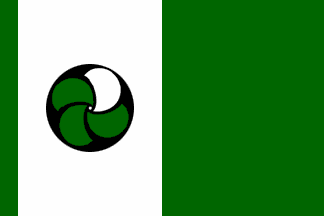
image by Ivan Sache, 22 Dec 2016

Last modified: 2025-11-01 by antónio martins
Keywords: mpd | movimento para a democracia | windmill (stylized) | confiança | veiga (carlos) | map |
Links: FOTW homepage |
search |
disclaimer and copyright |
write us |
mirrors

image by Ivan Sache, 22 Dec 2016
See also:
External links:
The MpD party is one of the two biggest political parties in Cape
Verde (the other is P.A.I.C.V.).
Cláudio Alexandre Duarte, 6 May 2004
The MpD, a liberal, right-of-center party, was founded on 14 March
1990 following the establishment of multipartism in Cape Verde. The party
won the 1991 elections and remained the governing party until 2001, the
MpD leader António Mascarenhas Monteiro being President of the
Republic in the same period. In 2001, the MpD was defeated by its
traditional rival, the PAICV, in the legislative and presidential
elections, and has been since then the main opposition party.
Ivan Sache, 13 Apr 2009
According to the
English
Wikipedia article, the much less successful
P.C.D. was created from an M.p.D. split in
1994.
António Martins, 22 Dec 2016
The flag of MpD, as shown transiently on the party’s website, and more
clearly on a photo published by newspaper
Liberal,
24 December 2008, is vertically divided white-dark green with the
party’s emblem (without the "MPD" acronym) in the white part. The
flag has a thin vertical dark green stripe along the hoist.
Ivan Sache, 13 Apr 2009
The official M.p.D. flag is still in official use as can be attested for
2013
(same photo as in 2008; see
context),
and 2015 (see
context).
António Martins, 22 Dec 2016
In the 2016 municipal elections
official
infogram M.p.D.’s color is dark green.
António Martins, 22 Dec 2016
The emblem of MpD is prescribed in the party’s statutes, last revised in October 2006:
»…«Article 1
(Denomination, acronym and symbol)
The symbol of the party is made of four fan blades, three green and one white, place on a black circle and surmonted by the acronym "MPD", as shown on the model that is attached to these statutes and full part of them, as approved by all the members of the Convention’s Board.Ivan Sache, 13 Apr 2009
The official rendition of the logo is available at the official
Electoral
Commission website and at the
party’s
weblog, used i.a. to illustrate the
party
statues.
António Martins, 22 Dec 2016
There are several unofficial M.p.D. flags.
António Martins, 22 Dec 2016
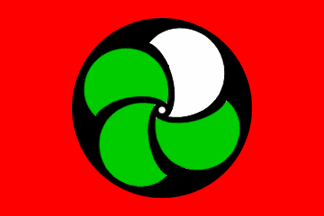
image by António Martins, 22 Dec 2016
While M.p.D.’s official color is green, red
have been growingly associated with this party, at least since the
(unsuccessful) 2006 presidential bid of Carlos
Veiga. Red flags with the party logo could be
seen
in 2012, during the the parlamentary
elections (which the M.p.D. did won), and in the
Sept.
2016 local elections campaign.
António Martins, 22 Dec 2016
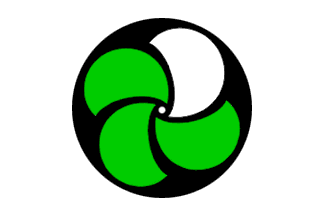
image by António Martins, 06 Nov 2018
A person I met from Cape Verde commented about a flag which is a
white ground and a circle in the middle of it; inside of the circle
is some kind of leaves going around each other.
Ásta Einarsdóttir, 30 Mar 2000
I believe that it is the flag of the MpD Party. As far as I remember
the MpD flag has a white field, a black circle centered in that
field, and some kind of a green wind fan within the circle.
Cláudio Alexandre Duarte, 6 May 2004
Here’s another white flag (see
context),
this time with the party logo and name, used in the
April 2016 parliament elections.
António Martins, 22 Dec 2016
The logo of M.P.D. shows on
this
photo, a four-sail wind wheel yellow, red, blue and green.
António Martins, 21 Nov 2006
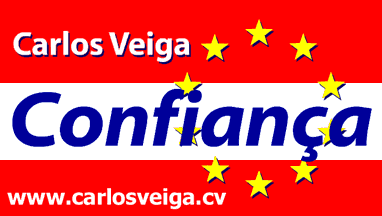
During the February 2006 presidential elections in Cape Verde,
(defeated) candidate Carlos Veiga used as his campaign logo a design
loosely based on the national flag: a red
panel with a white stripe below the middle with blue letters reading
"Confiança" (Portuguese for "trust") and a
ring of 10 yellow stripes superimposed on the white stripe. (The
website was still available
[on 2006.11] and shows this design in
vectorial
detail.) This was used as a makeshift campaign flag (made of plastic,
printed on one side only, probably not meant to be used as flags).
Examples in online photos:
#qp210,
#cc246,
#vp246,
#cm246,
#cm246,
#sa246 and
#sa246.
António Martins, 21 Nov 2006
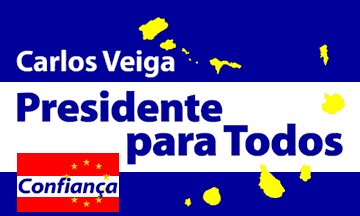
The complete panel (showing a map of the country) had the same flag-like use.
Examples in online photos:
#vp214,
#vp225,
#cm212,
#bt300
and
#bt308.
More examples in online photos (both types):
#vp217,
#vp226,
#vp234,
#vp250,
#cm269,
#sa212,
#sn241 and
#bt290.
António Martins, 21 Nov 2006
Anything below this line was not added by the editor of this page.